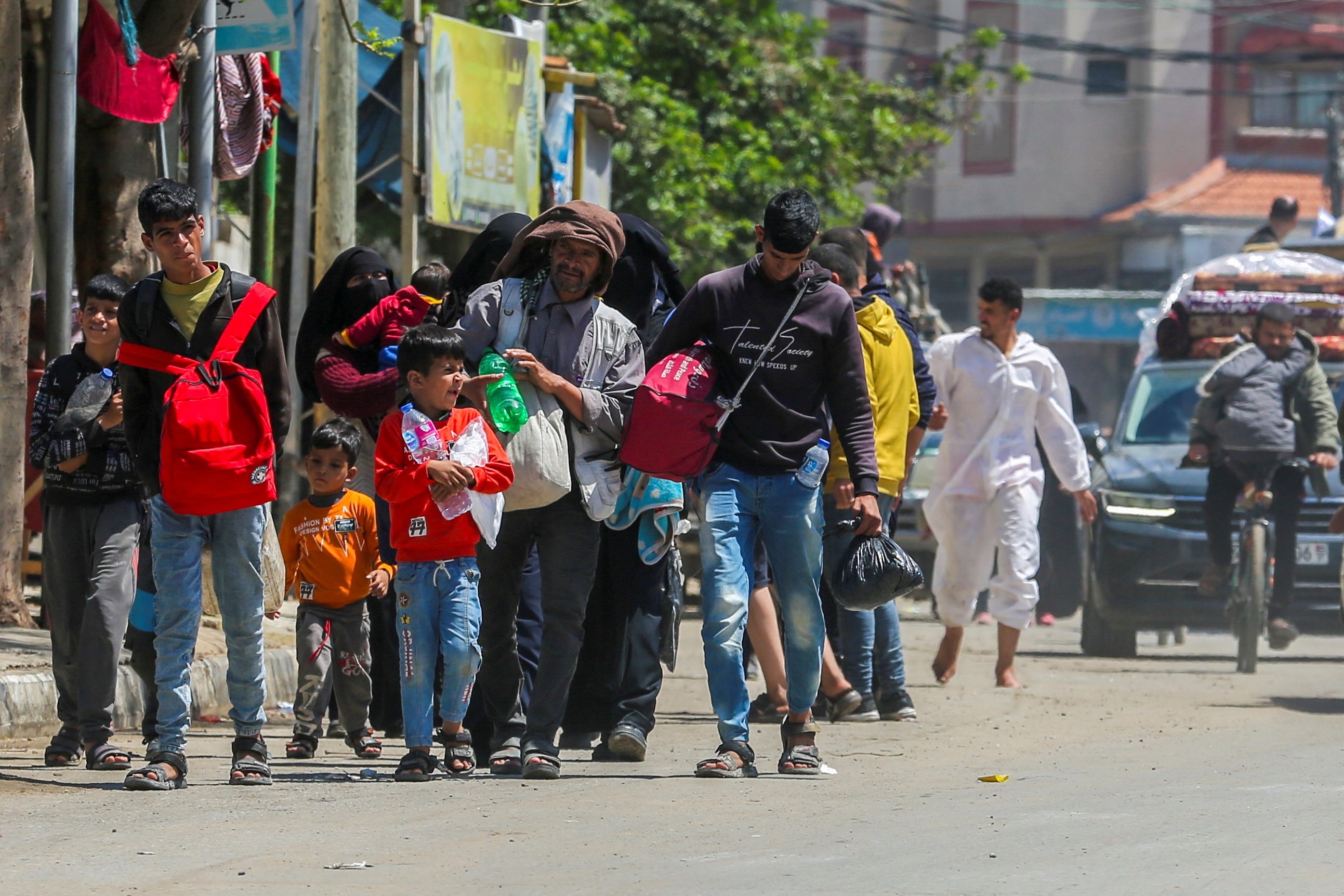If Israel mounts an assault on Rafah, we will witness the desperate consequences of this terrible war
Editorial: More than a million civilians are crowded into makeshift camps in and around the city in southern Gaza. In the absence of a ceasefire, human disaster on a massive scale looks impossible to avoid

It is hard to extract any crumb of comfort whatsoever from the latest developments in and around Israel and Gaza.
In the clearest sign yet that Israel intends to go ahead with its long-threatened assault on Rafah, its defence forces warned some of the hundreds of thousands sheltering in parts of the southern Gazan city to move to what it called an expanded “humanitarian area”.
The warning, which the IDF cast as “encouragement” or “advice”, rather than an order for a “wide-scale evacuation”, follows continuing negotiations in Cairo about a ceasefire and the release of at least some, if not all, of the remaining hostages.
As if this was not enough bad news for 24 hours, one of the major aid crossing points into Gaza was closed after the killing – claimed by Hamas – of four Israeli soldiers.
Meanwhile, the Israeli authorities moved to shut down the offices of Qatar-funded broadcaster, Al Jazeera, whose reporters have been among the very few still filing dispatches from Gaza. Even that small real-time window on the war zone may now have closed.
It is possible that all these are quite separate developments, individual markers of the wider failure to scale back or start bringing an end to the armed conflict that began with the murderous Hamas rampages of 7 October.
But it is also possible that, unless the Cairo talks bear fruit soon, the die on Israel’s long-planned Rafah assault has been cast, and that the silencing of Al Jazeera is intended to delay or prevent the reality of that assault coming out.
At best, perhaps, the IDF warnings might be seen as a last act of negotiating brinkmanship, but a token at the same time of Israel’s intent.
With Israel still examining Hamas’s acceptance of a proposal from Egyptian and Qatari mediators, the odds look increasingly likely that Israel will mount its assault on southern Gaza within the coming days. If that is so, the consequences are likely to be among the most desperate witnessed in the whole of this war.
More than a million civilians are currently crowded into makeshift camps in and around Rafah – refugees who had no choice but to flee the fighting and devastation in northern and central Gaza. In the absence of a ceasefire, or at very least well-protected humanitarian corridors, human disaster on a massive scale looks nigh-impossible to avoid.
An Israeli assault will also put Egypt on the spot. Having managed to stay out of the conflict so far, except to offer its services as peace-maker, Egypt will face the very same international pressure to open its border that it faced at the start of the war, except that the urgency and the scale of human misery risks being many times what it was, even then.
To keep its border closed risks international ire; yet to open it would carry the risk of destabilising that part of Egypt and perhaps spreading the conflict to the wider Middle East in a way that has so far – for the most part – been mercifully avoided.
If an all-out Israeli assault on Rafah does go ahead, it will not be for want of warnings from practically everyone who might be thought to have some influence with Israel and its prime minister, Benjamin Netanyahu.
The US president has repeatedly, and ever more publicly, warned Israel against any attack on Rafah without ensuring the safety of civilians – Joe Biden spoke with Mr Netanyahu again on Monday and again raised his concerns about an assault on Rafah.
The EU’s chief diplomat, Josep Borrell, called on Israel to renounce any planned ground offensive, describing what he said would be “more war and famine” as “unacceptable”.
Inside Israel, some of the largest protests so far called for priority to be given to securing the hostages’ release and a former prime minister, Ehud Olmert, reiterated his vocal opposition to any offensive in Rafah, demanding that the current government “stop the fighting now” and warning that the chances of a significant military victory were small.
But the international image of Hamas is hardly a consideration for the group, other than as a die-hard foe of Israel. Israel, for its part, has paid scant heed to condemnation of its conduct abroad, which has come, unusually, almost as much from long-standing allies as from adversaries abroad.
Until now, however, it had mostly stopped short of silencing its foreign critics; with the forced shutdown of Al Jazeera that barrier, too, has been breached.
When circumstances become this bleak, consolation may sometimes be drawn from the conviction that things cannot get worse. In the tragedy and barbarism of this now seven-month-old war, practically anyone who has been touched by it in any way has learned that, alas, it can.






Join our commenting forum
Join thought-provoking conversations, follow other Independent readers and see their replies
Comments